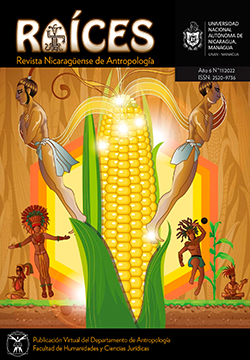Stigma, Violence and Marginalization; the concealment of the exercise of street prostitution
DOI:
https://doi.org/10.5377/raices.v6i11.14472Keywords:
Agency, stigma, violence, old ageAbstract
An empirical investigation is presented from the field of social anthropology during which the context of street prostitution in the La Merced neighborhood of Mexico City was observed in relation to women of middle age. The research was carried out over a period of two years, from 2018 to 2020, where information is collected that allows drawing the social relationships in which the women who carry out this work find themselves, highlighting other social roles such as being grandmothers, mothers, sisters and daughters in a prostitution system where their sense of agency is limited and the stigma attached to their trade makes them lead a double life. Likewise, the methodological difficulties to carry out the fieldwork are shown, starting with the cover-up of being a researcher for my own protection, that of the foundation’s staff and that of the women with whom it was shared due to the dynamics and the context of La Merced, hindering the use of data collection instruments and technological resources. Thus, the investigation was based not only on what was observed, heard and his field diary but also through drawings that were created through my dialectic, my sensations and the same sensitivity that the artist who made them expressed, accrediting a methodological flexibility. Therefore, what is found in the research through ethnographic work and the same illustrations are highlighted.
Downloads
References
Daich, Devora (2018) Aportes de la antropología feminista para el debate local sobre la prostitución. Runa 39. (1):5-22. < http://revistascientifi cas.fi lo.uba.ar/index.php/runa/article/view/3888> Consultado el 8 de septiembre de 2019 [PDF]
Fassin, Didier (2016) La fuerza del orden. Una etnografía del accionar policial en las periferias urbanas. Trad. Andrea Sosa Varrotti. Siglo Veintiuno Editores. Buenos Aires.
Goffman, Erving (1963) Estigma. La identidad deteriorada. Trad. Leonor Guinsberg. Amorrortu editores, Buenos Aires.
Kovats, Christopher (2002) Negotiating Dangerous Fields: Pragmatic Strategies for Fierdwork amid Violence and Terror. American Anthropologist, New Series, 104, (1), marzo: 208-222. <https://anthrosource.onlinelibrary.wiley.com/doi/abs/10.1525/aa.2002.104.1.208>. Consultado el 8 de octubre del 2019 [PDF].
Long, Norman (2007) Sociología del desarrollo: una perspectiva centrada en el actor. Centro de Investigación y Estudios Superiores en Antropología Social: El Colegio de San Luis. México.
Downloads
Published
How to Cite
Issue
Section
License
Copyright (c) 2022 © Universidad Nacional Autónoma de Nicaragua, Managua, UNAN-Managua

This work is licensed under a Creative Commons Attribution-NonCommercial-ShareAlike 4.0 International License.




